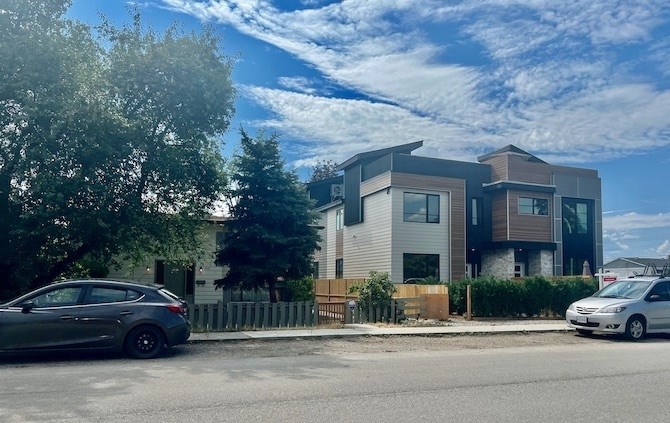Fourplex plan creates a 'wealth windfall' for single-family home owners: expert
New legislation proposed by the provincial government to allow fourplexes on most single-family lots could double the value of that land, creating a windfall for homeowners but also making it even harder for renters to get into the market, an expert says.
The change was introduced by Premier David Eby earlier this week as part of his Homes for People program.
READ MORE: Premier Eby clearing local government hurdles for more housing
The changes in zoning will allow fourplexes to be built on most single-family lots in B.C. without going through the sometimes long, expensive and controversial rezoning process through local government.
The City of Kelowna started allowing that in select neighbourhoods in 2017.
“There was a definite lift in value right when that happened,” Joe Ungaro, a real estate agent with Ungaro Albrecht Courtney and Associates/Royal LePage, told iNFOnews.ca last fall. “Homes that were $300,000 to $350,000 went to $600,000 overnight.”
READ MORE: Fourplexes set to replace housing in Kelowna, Kamloops
The majority of homeowners in B.C. who own single-family houses have benefitted from surging housing prices in recent years, UBC School of Population and Public Health professor Paul Kershaw told iNFOnews.ca this week. He is also the founder of Gen Squeeze, an organization that’s raising awareness about housing inequality between generations.
“Owners of single detached properties, in particular, have been getting the largest wealth windfalls in recent years,” Kershaw said. “What we’re doing right now is just giving one more wealth windfall to those who have benefited the most. But there is no plan whatsoever for the province, on behalf of municipalities, to collect some of that wealth.”
The property values doubled in Kelowna when it liberalized its zoning laws but that was confined to specific neighbourhoods in the downtown to KLO Road areas of the city.
Kershaw acknowledged that the price increase for the land may not be as extreme as it was in Kelowna if every part of a city is included but, Kershaw believes, it will still be substantial.
Will it really lead to more affordable housing?
Maybe.
"More supply will help address the demand constraints right now and that will help moderate the prices," Kershaw said. "If a number of people say we can really make some money here and I don’t mind having more density on my property, if we actually did really elevate the amount of new supply, that would be helpful in bringing in each additional unit at a price point closer to what people can afford."
In terms of payback for what wealth windfall there is, he has been lobbying for years for an increase in annual property tax rates for the portion of a home assessed at more than $1 million and says this approach should be implemented as part of these proposed changes.
READ MORE: Could a tax on million dollar homes help fight B.C.'s housing affordability crunch?
He also suggested that a capital gains tax be levied on some of the increased value of the affected lands.
The other thing that was not addressed by Eby’s announcement is the cost of expanding roads, sewers, water lines and parks that will be needed because of increased densities in many neighbourhoods.
Much of those costs are now borne by development cost charges to the builders, who pass them on to buyers.
Kershaw argues that his proposed new taxes should be applied against those infrastructure costs.
“Take the pressure off the developers,” he said. “It’s hard enough these days, in many respects, to build homes at a price point that someone with regular earnings can get into if they don’t have any other housing equity.”
Essentially, he applauds the Homes for People strategy but argues there needs to be some payback to the broader community that won’t be getting the wealth windfall.
‘It is appropriate for the provincial government to be requiring municipalities to be adding density to land that’s already been zoned for residences,” Kershaw said. "Places where we should be adding density is in land already zoned for residences."
To contact a reporter for this story, email Rob Munro or call 250-808-0143 or email the editor. You can also submit photos, videos or news tips to the newsroom and be entered to win a monthly prize draw.
We welcome your comments and opinions on our stories but play nice. We won't censor or delete comments unless they contain off-topic statements or links, unnecessary vulgarity, false facts, spam or obviously fake profiles. If you have any concerns about what you see in comments, email the editor in the link above.




